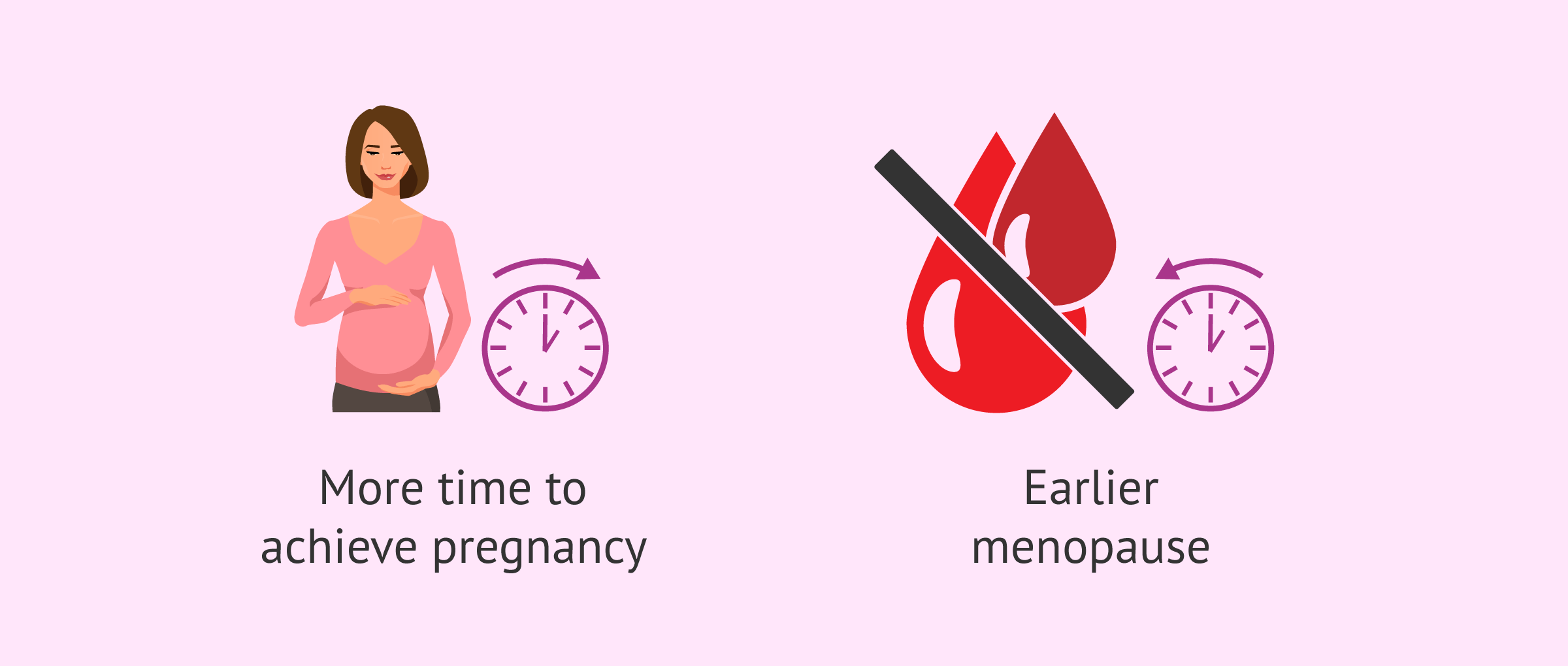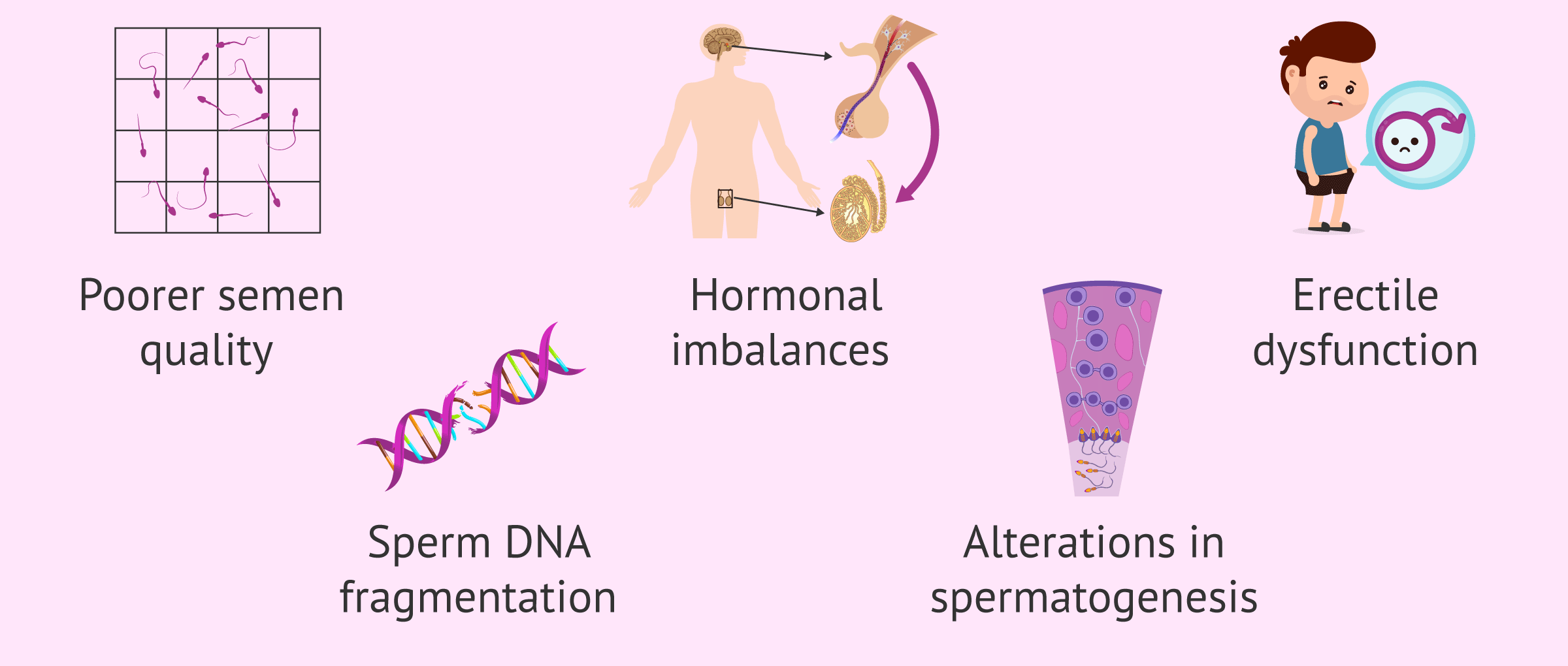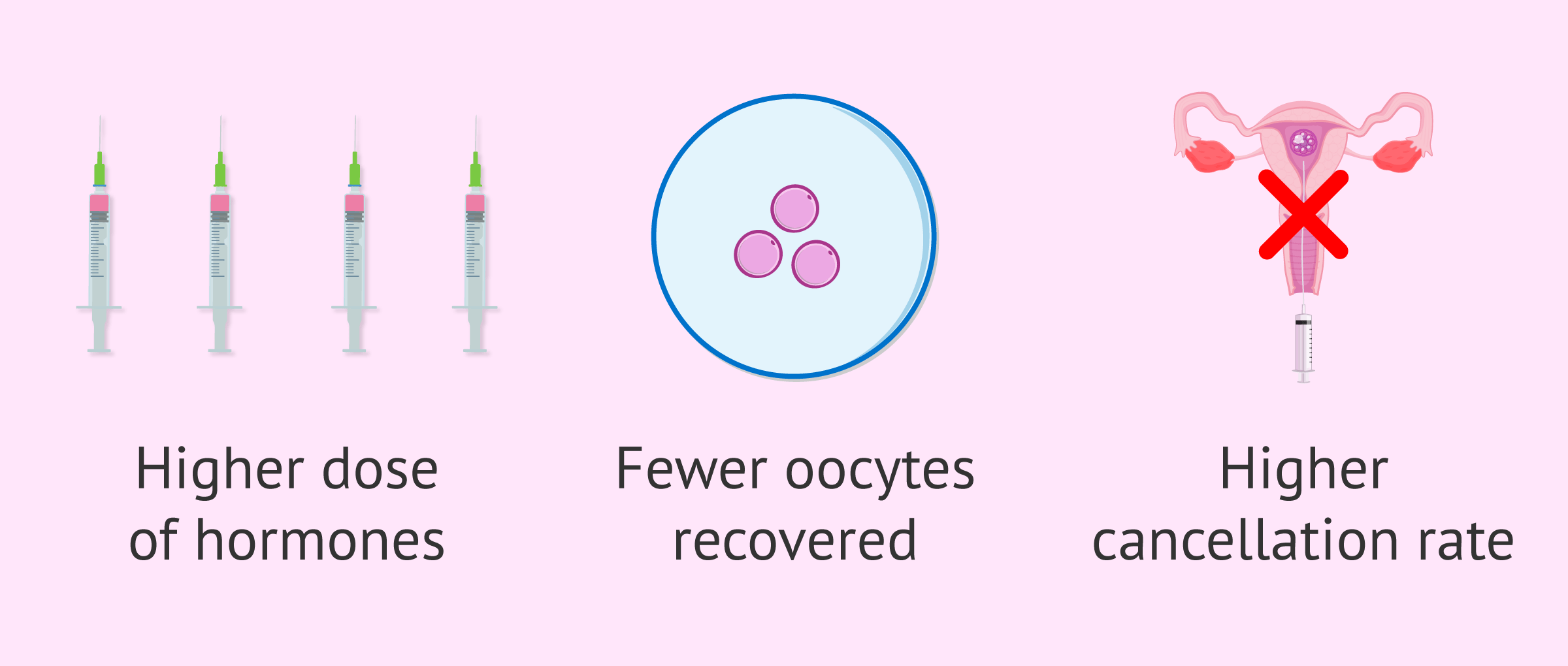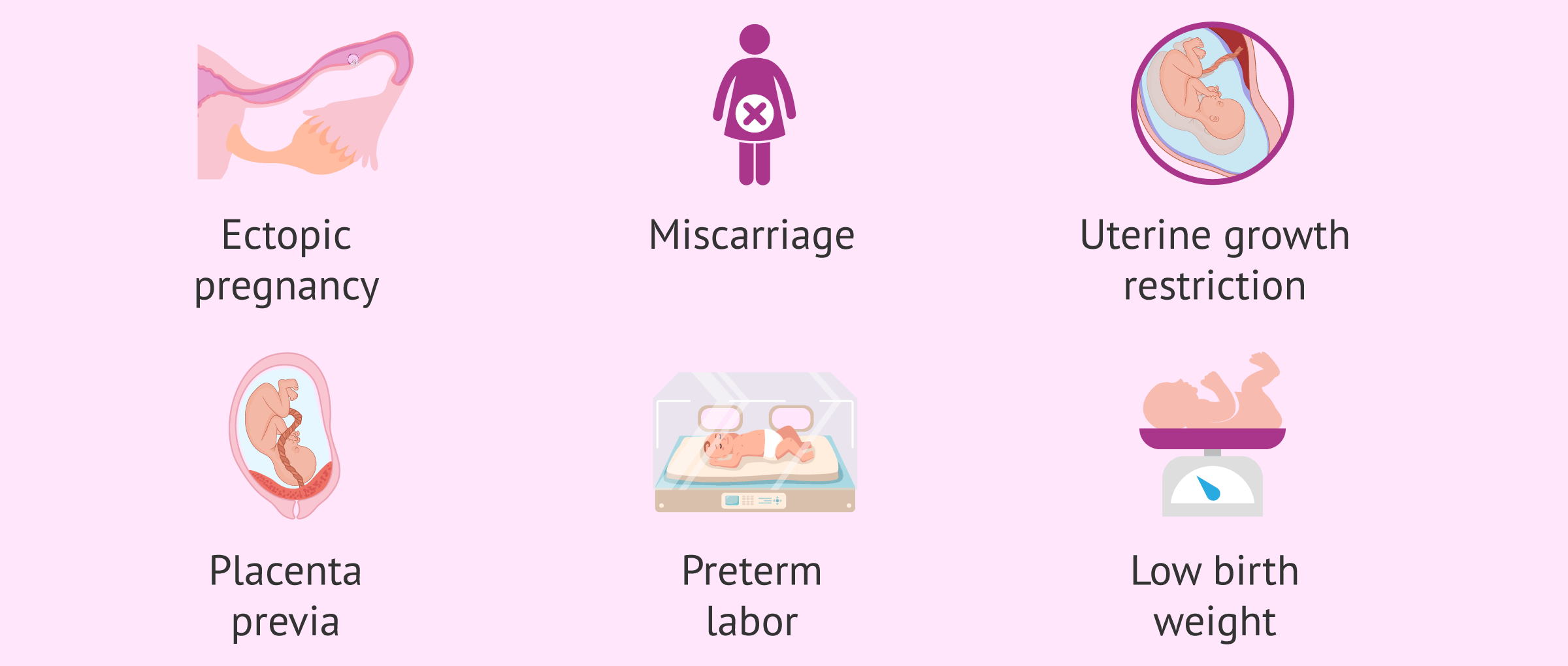Smoking has important negative effects on general health, such as an increased risk of certain types of cancer and cardiovascular problems. However, although perhaps less well known, tobacco also affects the reproductive capacity of women and men.
On the other hand, smoking increases the risk of some complications during pregnancy and even has harmful consequences for the offspring.
Provided below is an index with the 9 points we are going to expand on in this article.
- 1.
- 2.
- 3.
- 4.
- 5.
- 6.
- 6.1.
- 6.2.
- 6.3.
- 6.4.
- 7.
- 8.
- 9.
Tobacco and female fertility
Tobacco decreases a woman's fertility, although the exact mechanism by which it does so is not entirely clear.
Smoking could affect ovarian hormone synthesis, fallopian tube functionality, as well as the genetic content of oocytes. Even uterine receptivity may also be altered in women smokers.
All this would lead to the fact that the time to pregnancy is increased in women smokers compared to non-smokers (with the disadvantage that this occurs even when the woman is a passive smoker).
On the other hand, it is important to mention that smoking is also related to an earlier age of menopause (from 1 to 4 years with respect to non-smoking women). This is of particular importance today, as childbearing is increasingly delayed.
However, some of this damage to fertility may be dose-dependent, i.e., the number of cigarettes a woman smokes per day. In addition, if the woman stops smoking, there is the advantage that certain negative effects can be reversed.
Thus, any woman who wishes to become a mother (even if it is in the future), should stop smoking if she already does so, or not start smoking.
Tobacco and male fertility
Smoking can also affect male fertility by affecting seminal quality. It appears that the seminal parameters most affected by smoking are sperm concentration and sperm motility, although this effect may depend on the number of cigarettes smoked per day.
However, other reproductive aspects may also be altered in male smokers. Among them, we can mention the following:
- Dysfunction in the hormonal system.
- Alterations in spermatogenesis, sperm maturation and sperm function.
On the other hand, oxidative stress in male smokers produced by an increase in reactive oxygen species (ROS) could damage sperm DNA, increasing what is known as sperm DNA fragmentation.
In addition, smoking can even increase the risk of erectile dysfunctionproblems.
For all these reasons, quitting smoking can have benefits for male fertility.
Does smoking affect assisted reproduction?
Women smokers undergoing assisted reproduction treatments have a lower response to stimulation and require a higher dose of hormones to stimulate the ovaries. Nevertheless, the number of oocytes retrieved in follicular puncture tends to be lower and the rate of canceled cycles may be increased.
In addition, in general, female smoking affects the outcomes of assisted reproductive techniques, including clinical pregnancy and live birth rates.
Regarding the effect of male smoking on assisted reproduction techniques, the results are more controversial. One of the possible reasons for this is that it is difficult to separate the direct effect of smoking on the male from the indirect negative effects that passive smoking can have on his partner.
Tobacco in pregnancy
Smoking not only decreases fertility, but is also associated with negative consequences for pregnancy. Among the main obstetric complications that smoking can cause during pregnancy are the following:
- Ectopic pregnancy
- Spontaneous abortion
- Intrauterine growth restriction.
- Placenta previa.
- Premature rupture of membranes.
- Premature delivery
- Low birth weight.
- Perinatal mortality.
In addition, if the mother smokes during pregnancy, there could be a negative effect on the seminal quality of her male offspring.
Recommendations
As it could not be otherwise, the main recommendation is, ideally, not to start smoking. If the woman or man is already a smoker, he or she should quit smoking as soon as possible.
However, quitting smoking can be especially hard and complicated. For this reason, the smoker should not hesitate to consult his or her physician if he or she is experiencing difficulties.
However, smoking is not the only lifestyle habit that can affect fertility, so alcohol and drug use should also be avoided.
On the contrary, eating a varied and balanced diet, exercising moderately and maintaining an adequate body mass index (BMI) are healthy habits that will bring benefits for general health, but also for fertility.
FAQs from users
Does quitting smoking have advantages for assisted reproduction?
Yes. By quitting smoking, the reproductive future of couples or patients who want to have a baby will improve.
Does smoking affect artificial insemination?
In the case of reproduction, virtually all studies support the fact that smoking has a negative impact on the reproductive future. When women smokers are compared to non-smokers, the infertility rate and the time to conception is longer in women who smoke than in non-smokers. Smoking appears to accelerate the loss of eggs and reproductive function and may accelerate the time to menopause by several years.
In relation to men, those who smoke have a lower sperm count, lower motility and fewer normal forms in seminograms. However, the effects of smoking on male fertility have not been conclusive.

Therefore, in cases in which Artificial Insemination treatments are indicated, if we have a semen sample with decreased concentration, motility and morphology, this treatment could not be indicated. In the case of women who smoke, as the quality and quantity of eggs decreases, pregnancy rates in this type of treatment will also be compromised.
Does tobacco decrease fertility?
Yes, smoking is bad for fertility, both male and female.
In the case of men, in addition to affecting seminal quality, smoking could be related to alterations in spermatogenesis, to greater fragmentation of sperm DNA and even to problems of erectile dysfunction.
As for female fertility, a woman who smokes may need more time to become pregnant than a non-smoker. In addition, menopause may be 1 to 4 years earlier than in women who do not smoke.
Are the effects of smoking on male fertility improved by vitamins?
The ideal way to improve the effects of smoking on male fertility is to quit smoking as soon as possible.
Once this is done, some vitamin supplements, especially those containing antioxidants such as vitamin C and E, could improve the negative effects related to oxidative stress.
However, it is recommended that the male always consult a specialist so that he can supervise the intake of these supplements, as well as adjust the dosage.
Recommended readings
As we have mentioned, smoking is not the only habit that can affect fertility. If you want to continue reading about this topic, we recommend you to access the following link: Lifestyle influence on fertility and assisted reproduction.
On the other hand, if you want to learn more about the negative effects of smoking on pregnancy, you can read this article: What effects does smoking during pregnancy have on the baby?
We make a great effort to provide you with the highest quality information.
🙏 Please share this article if you liked it. 💜💜 You help us continue!
References
Augood C, Duckitt K, Templeton AA. Smoking and female infertility: a systematic review and meta-analysis. Hum Reprod. 1998 Jun;13(6):1532-9. (See)
Dai JB, Wang ZX, Qiao ZD. The hazardous effects of tobacco smoking on male fertility. Asian J Androl. 2015 Nov-Dec;17(6):954-60. (See)
de Angelis C, Nardone A, Garifalos F, Pivonello C, Sansone A, Conforti A, Di Dato C, Sirico F, Alviggi C, Isidori A, Colao A, Pivonello R. Smoke, alcohol and drug addiction and female fertility. Reprod Biol Endocrinol. 2020 Mar 12;18(1):21. (See)
Hull MG, North K, Taylor H, Farrow A, Ford WC. Delayed conception and active and passive smoking. The Avon Longitudinal Study of Pregnancy and Childhood Study Team. Fertil Steril. 2000 Oct;74(4):725-33. (See)
Mínguez-Alarcón L, Chavarro JE, Gaskins AJ. Caffeine, alcohol, smoking, and reproductive outcomes among couples undergoing assisted reproductive technology treatments. Fertil Steril. 2018 Sep;110(4):587-592. (See)
Practice Committee of the American Society for Reproductive Medicine. Electronic address: asrm@asrm.org; Practice Committee of the American Society for Reproductive Medicine. Smoking and infertility: a committee opinion. Fertil Steril. 2018 Sep;110(4):611-618. (See)
Soares SR, Simon C, Remohí J, Pellicer A. Cigarette smoking affects uterine receptiveness. Hum Reprod. 2007 Feb;22(2):543-7. (See)
Waylen AL, Metwally M, Jones GL, Wilkinson AJ, Ledger WL. Effects of cigarette smoking upon clinical outcomes of assisted reproduction: a meta-analysis. Hum Reprod Update. 2009 Jan-Feb;15(1):31-44. (See)
FAQs from users: 'Does quitting smoking have advantages for assisted reproduction?', 'Does smoking affect artificial insemination?', 'Does tobacco decrease fertility?' and 'Are the effects of smoking on male fertility improved by vitamins?'.
Authors and contributors

More information about Cristina Algarra Goosman







Hello, my husband smokes a lot, is it possible that is why I am not getting pregnant…? I am 28 years old and we have been trying for 10 months.
Hello Carolina,
Your husband’s smoking can indeed affect the chances of pregnancy. In men who smoke, alterations in spermatogenesis and poorer seminal quality can be observed, among other things.
In addition, if you are present in the room or inhale passive smoke, smoking can also affect you.
In general, at your age, it is recommended to see a specialist after one year of sexual intercourse without pregnancy. I recommend that you try to eliminate smoking and continue to search for pregnancy until at least one year has passed when you should contact the specialist.
I hope I have helped you,
Good luck
Hi, until a few months ago I used to smoke quite a lot, almost a pack a day but since I found out I am pregnant I have reduced it to two cigarettes a day, is it healthy or can it harm the baby?
Hello Olivia,
There is no number of cigarettes that can be justified as healthy during pregnancy. Continuing to smoke throughout your pregnancy can have negative effects on both you and the baby, specifically the baby.
Generally, there is an increased chance of miscarriage as well as intrauterine growth complications leading to premature delivery or low birth weight.
I recommend that you try to totally eliminate tobacco from your life during pregnancy. If you find it difficult, you can always go to your doctor to help you find a healthy way to quit smoking that is beneficial for both of you.
I hope I have helped you,
Best regards